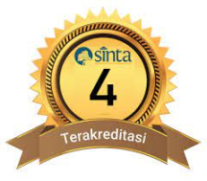Validitas LKS berbasis problem solving untuk mencapai keterampilan 4C pada materi suhu kalor dan teori kinetik gas kelas XI SMA/MA
Abstract
Full Text:
Download PDFReferences
Undang-Undang Republik Indonesia No. 20 Tahun 2003 Tentang Sistem Pendidikan Nasional.
Peraturan Pemerintah Republik Indonesia No. 19 Tahun 2005 Tentang Standar Nasional Pendidikan.
Zulhilyah. 2013. Pengaruh Metode Pembelajaran Creative Problem Solving Terhadap Keterampilan Berfikir Kreatif dan Komunikasi Dalam Pembelajaran IPS. Universitas Pendidikan Indonesia, 2.
Hosnan, M. 2014. Pendekatan Saintifik dan Kontekstual Dalam Pembelajaran Abad 21. Bogor: Ghalia Indonesia.
Kemendikbud. 2017. Panduan Implementasi Keterampilan Abad 21 Kurikulum 2013 di SMA. Jakarta: Direktorat Jendral Manajemen Pendidikan Dasar dan Menengah..
Fatmawati,H., Mardiyana., Triyanto. 2014. “Analisis Berpikir Kritis Siswa Dalam Pemecahan Masalah Matematika Berdasarkan Polya Pada Pokok Bahasan Persamaan Kuadrat”. Jurnal Elektronik Pembelajaran Matematika, Vol.2. No. 9, November 2014, 899-910. Surakarta: Universitas Sebelas Maret Surakarta.
Afrizon, R., & Wulan, R. d. 2012. “Peningkatan Perilaku Berkarakter Dan Keterampilan Berpikir Kritis Siswa Kelas IX MTsN Model Padang Pada Mata Pelajaran IPA-FSIKA Menggunakan Model Problem Based Instruction”. Jurnal Penelitian Pembelajaran Fisika, ISSN:2252-3014.
Shoimin, A. (2014). 68 Model Pembelajaran Inovatif dalam Kurikulum 2013. Yogyakarta: AR-RUZZ Media.
Satria Dewi, W. & Afrizon, Renol. 2018. “Analisis Kondisi Awal Perkuliahan Mahasiswa Pendidikan Fisika Dalam Rangka Mengembangkan Bahan Ajar Statistika Pendidikan Fisika Menggunakan Model Problem Solving”. Jurnal Eksakta Pendidikan (JEP), Vol 2. No.1, Mei 2018, 93-100. Padang: Universitas Negeri Padang.
Abdullah S, Ridwan. 2013. Inovasi Pembelajaran. Jakarta: Bumi Aksara.
McCormick, C., & Raines, J. 2015. "Engaging Students in Critical Thinking and Problem Solving : A Brief Review of The Literature". Jurnal of Studies in Education.
Prastowo, A. 2011. Panduan Kreatif Membuat Bahan Ajar Inovatif : Menciptakan Metode Pembelajaran Yang Menarik dan Menyenangkan. Yogyakarta: Diva Press.
Sugiyono. 2017. Metode Penelitian Kuantitatif, Kualitatif dan R&D. Bandung: Alfabeta.
Riduwan. 2009. Belajar Mudah Penelitian Untuk Guru-Karyawan dan Peneliti Pemula. Bandung: Alfabeta.
DOI: http://dx.doi.org/10.24036/7295171074








